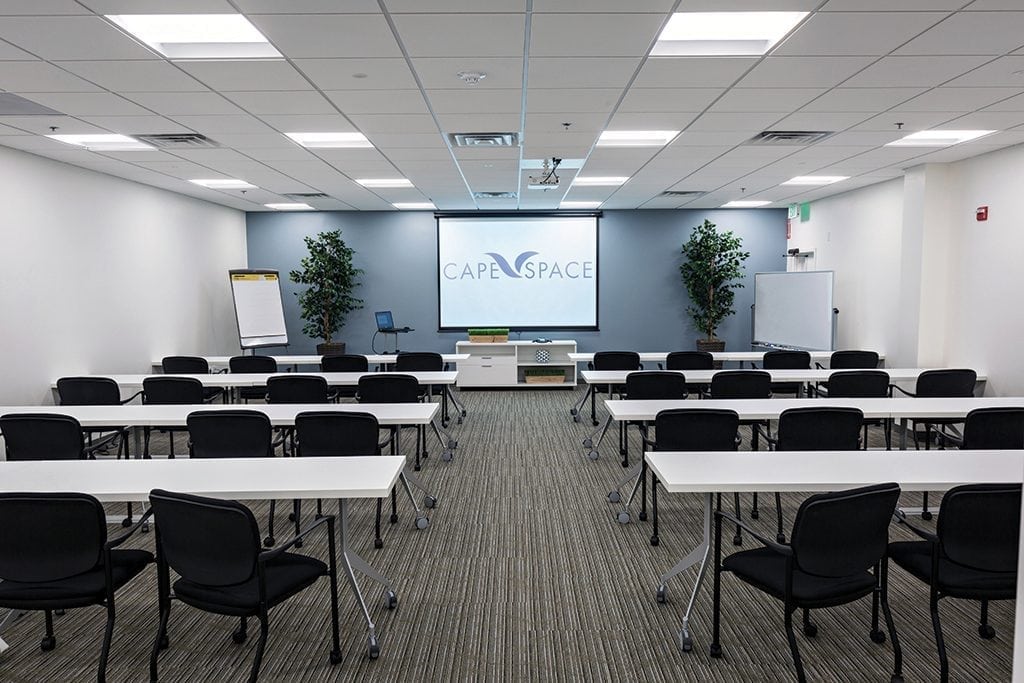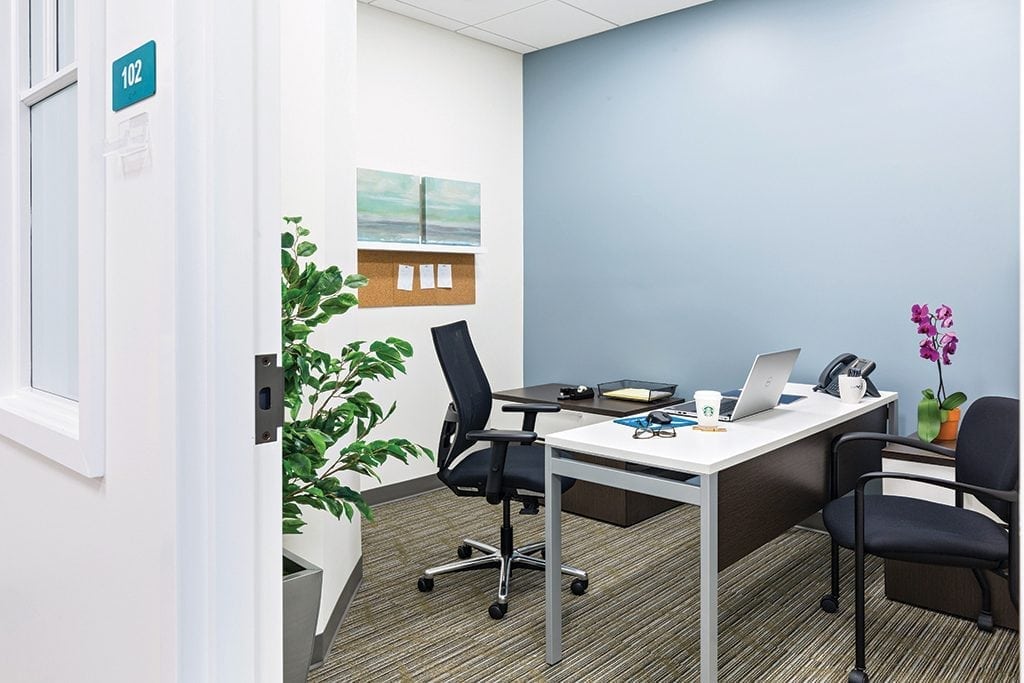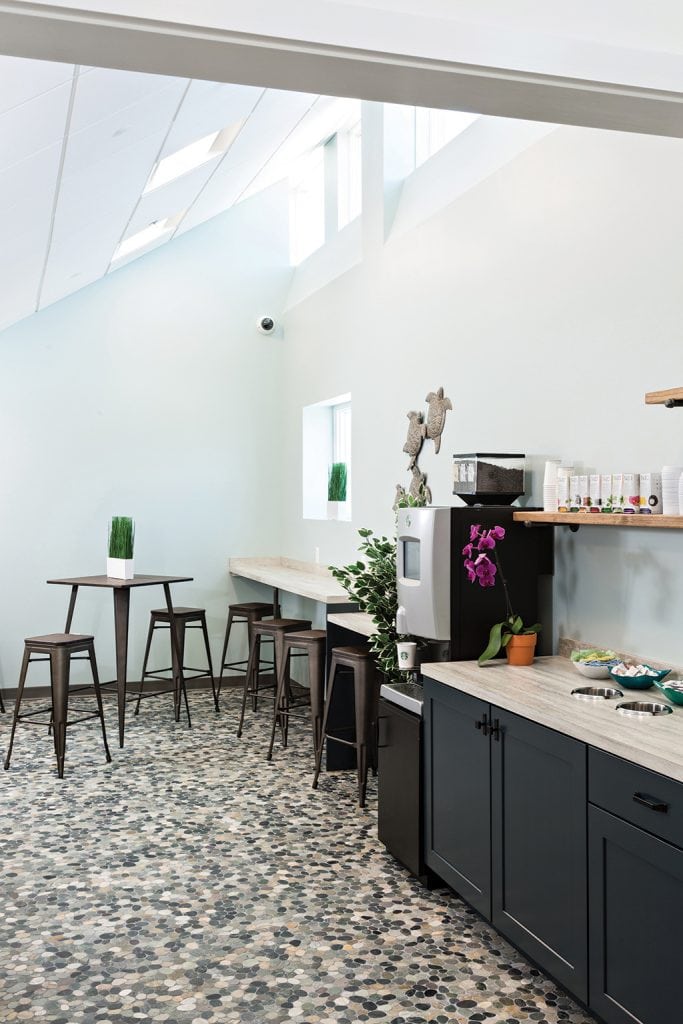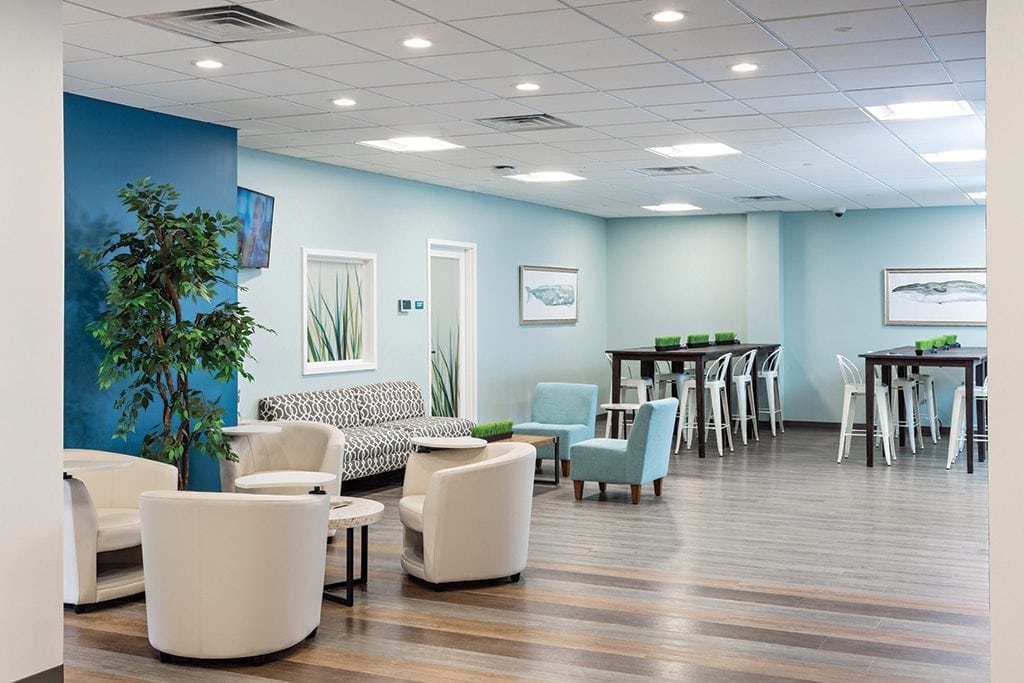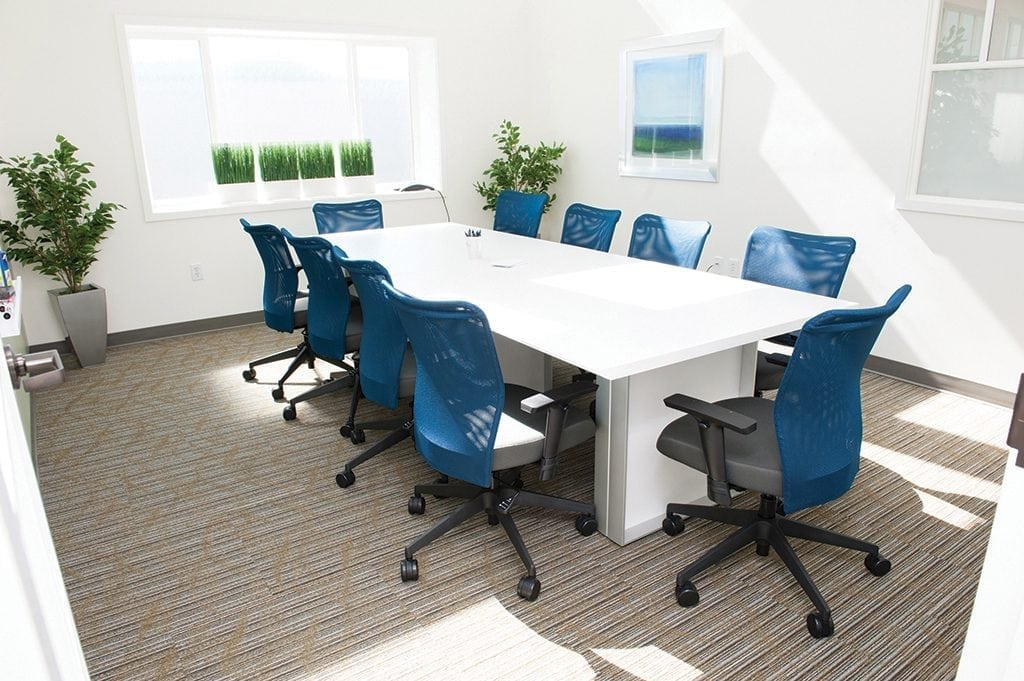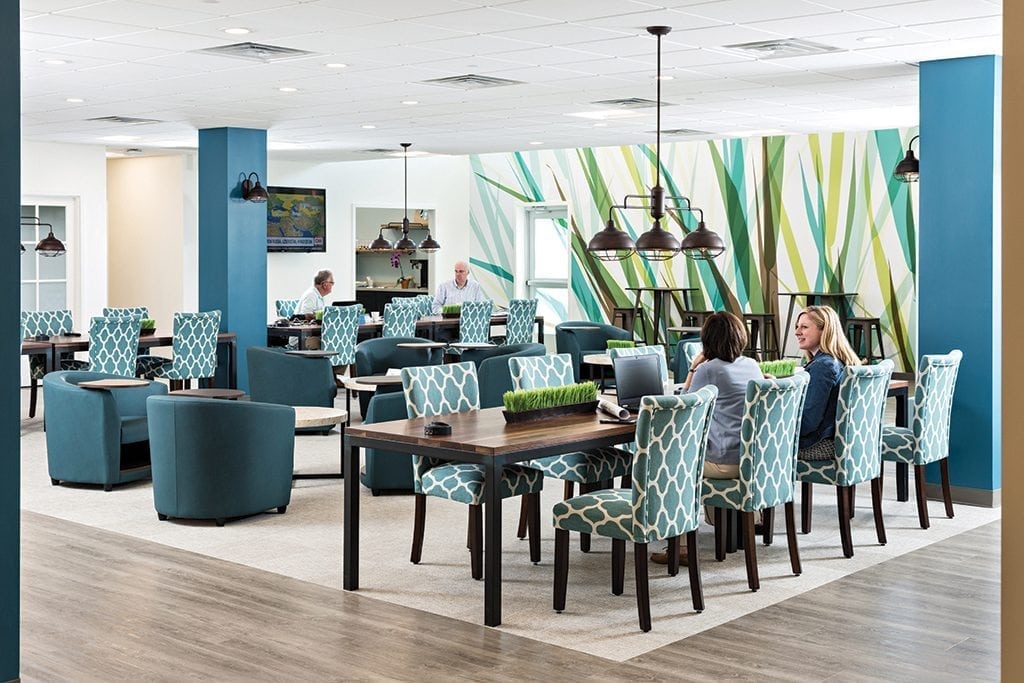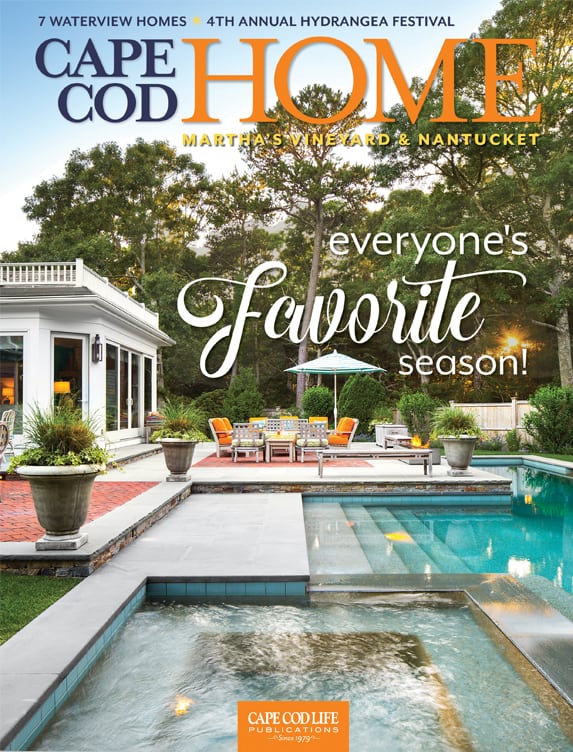
A new way to work
Cape Cod Home / Summer 2018 / People & Businesses
Writer: Mary Stanley / Photographer: Dan Cutrona
A new way to work

Cape Cod Home / Summer 2018 / People & Businesses
Writer: Mary Stanley / Photographer: Dan Cutrona

CapeSpace offers professionals a variety of options based on their needs, from private offices to communal meeting rooms and work spaces.
CapeSpace in Hyannis offers innovative professional offices with chic coastal flair
As the trend toward working remotely continues to rise, demand is increasing for business centers that offer all of the amenities of a professional office without the daily grind of a morning and evening commute, especially here on Cape Cod.
Recognizing the need for office space that can be shared among many local entrepreneurs, freelancers and small business owners, Robbin Orbison opened CapeSpace two years ago, and the response to her venture has been positive. Located in Independence Park in Hyannis, the professional space provides its 200 customers everything from private and communal workstations to photocopy and fax machines to a shared receptionist. Touting itself as Cape Cod’s first full-service “co-working” facility, users can rent space on a daily, hourly or monthly basis.
The concept for a shared office business model, Orbison says, first began about 50 years ago in California, when an attorney, who had some unoccupied offices in his firm, began leasing them out to unaffiliated attorneys. The idea caught on and centers began popping up throughout the country and beyond. One of the largest companies, says Orbison, is Regus, which has 3,000 locations worldwide.
While this concept has been around since the last half of the 20th century, the business model got a bit of a boost and began to evolve in the aftermath of the economic crash of 2008. Orbison explains that with the unemployment rate at that time so high, many people began freelancing and found themselves searching for a place, outside of their home, where they could do their work. While sitting at a Starbucks was certainly an option, it didn’t always offer privacy, or even photocopying services for that matter.
From that crisis, she says, grew the newer model that exists today—one that offers a myriad of options, including private offices, conference rooms, cubicle-like workstations, and even a business lounge similar to what you would see in an airport.
“Oftentimes, people who work remotely from home feel isolated, and today’s version of the shared office space offers them inexpensive access to a space with a community,” Orbison says. Remote workers can still have the water-cooler experience. “There are also business owners who want to have a presence here, but not necessarily the brick and mortar,” she adds.
At CapeSpace, members have a choice. Some days, Orbison says, a member may want to work in the business lounge, which offers a bit of socialization. Other days, that member may need a private office to conduct business.
CapeSpace also offers a virtual office membership. With this option, people can use the space as a business mailing address. Orbison says Google My Business may not recognize a home address as a business address, and using the CapeSpace address can help to solve that issue. “Members don’t even have to come into the office to pick up the mail. They can manage their mail through a mobile app and have it scanned, forwarded or shredded,” she says. In addition to sharing the amenities and space, members also share the receptionist/concierge services.
Orbison was first introduced to this business model while working in commercial real estate in New York City. “The company I was working for began creating co-working spaces as part of its commercial development projects. It was a great way to help fill a commercial building, and it gave business owners some options,” she says.
When she decided to open a shared workspace on Cape Cod, as with any real estate decision, location was a top priority. “It had to have access to OpenCape,” she says. (OpenCape was the only viable high-speed Internet solution available to the location, at the time.) “There are a lot of professionals who have second homes here, but the Internet at those homes isn’t necessarily high speed or even dependable,” she notes. Another need was ample parking to accommodate members and their clients.
It took a year and a half before Orbison settled on an 8,600 square foot space within a 40,000 square foot complex just across from the Home Depot.
While the location was ideal, the interior of the building was not, so she turned to the professionals at Brown Lindquist Fenuccio & Raber Architects, Inc. (BLFR) of Yarmouth Port to transform the space into the beautiful and welcoming center that it is today.
Though the space boasted high ceilings and transom windows, those architectural treasures were covered up by rooms with low drop ceilings that filled the space when it had been a medical practice. “We gutted most of the space,” says Rod Topolewski, project manager and architectural designer with BLFR. “We eliminated all of the examination rooms and brought it down to the bare minimum. We opened the space up to take full advantage of the windows and let the natural light flow in.”
One of the biggest challenges in the design, Topolewski says, was ensuring that the acoustics were right. “We used certain construction materials and a white noise system to cut down on noise levels,” he explains.
It was critical, Orbison says, that the design be functional and achieve the goal of giving people choices, whether they were looking for a private office to conduct business, a conference room to hold a meeting, or community space working alongside different professionals. “Overall, it was important to offer people a place where they could congregate, huddle, or have privacy if necessary,” she says.
The space also had to be inviting and beautiful and provide users with a sense of comfort. Because it is located on Cape Cod, she wanted the interior design palette to be reflective of “coastal chic,” which was brought to life by BLFR interior designer Paula Drury, using colors that mimic the ocean, dunes and seagrass. “I wanted to create a feeling of professionalism; at the same time, I wanted the space to reflect the seaside environment, they did an amazing job of helping me achieve that,” Orbison says.
Bar-height tables, along with club-style chairs in the communal space and conference tables surrounded by Caribbean blue chairs, help achieve Orbison’s vision. “I like to think of the space as professional yet comfortable and casual,” she says.
Rick Fenuccio, principal at BLFR, says the opportunity to work with Orbison on such an innovative concept is one that taught his firm a few new things.
Topolewski agrees and says this project prepared him for some of the designs that are coming across his desk these days. “I had heard of these shared office programs, but until CapeSpace, I had never worked on this type of design project,” he says. “The concept is very unique—where you have some shared communal spaces as well as private offices, and people from various backgrounds and industries working alongside one another. It’s the ideal form of networking.”
To learn more and reserve your own office or meeting room at CapeSpace, visit capespace.com.
Mary Stanley is a freelance writer who lives in Sandwich.


